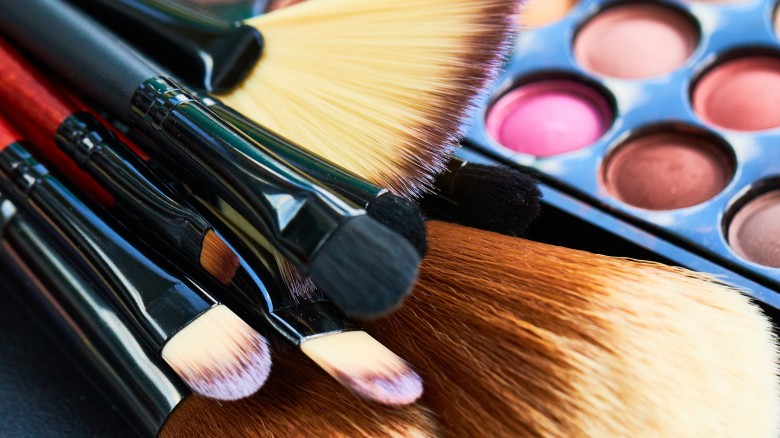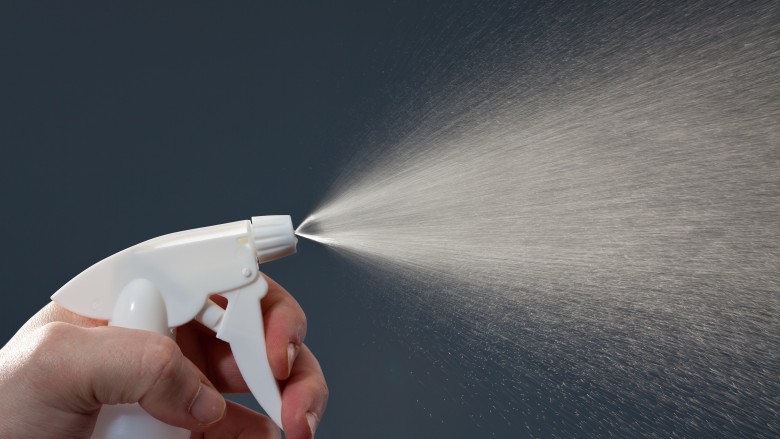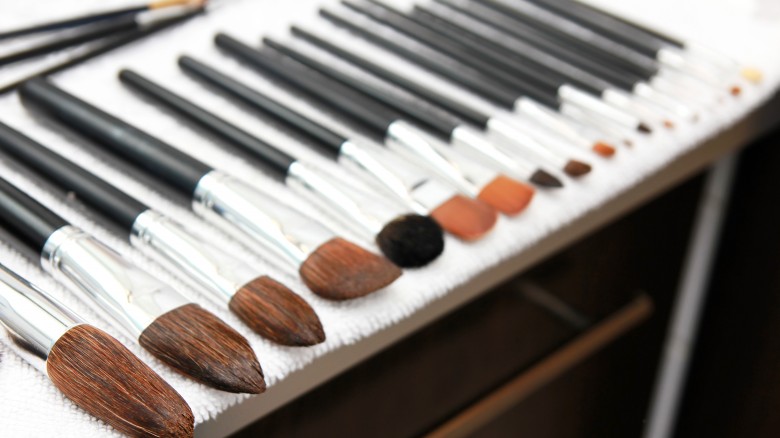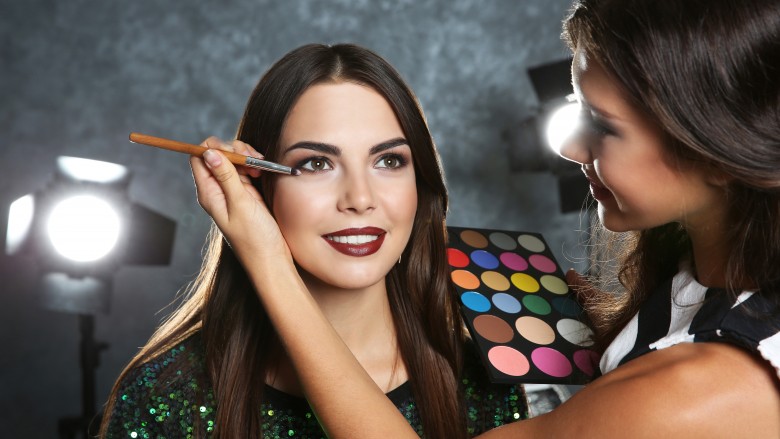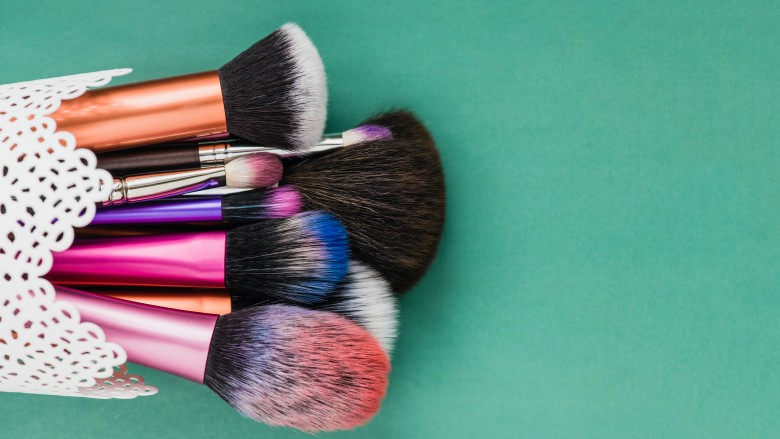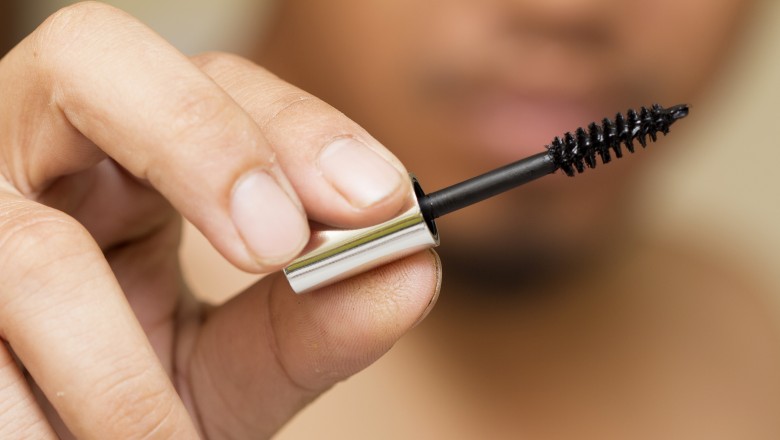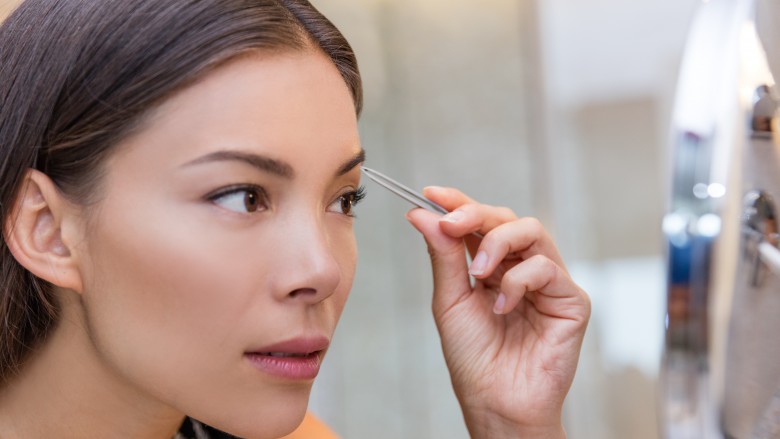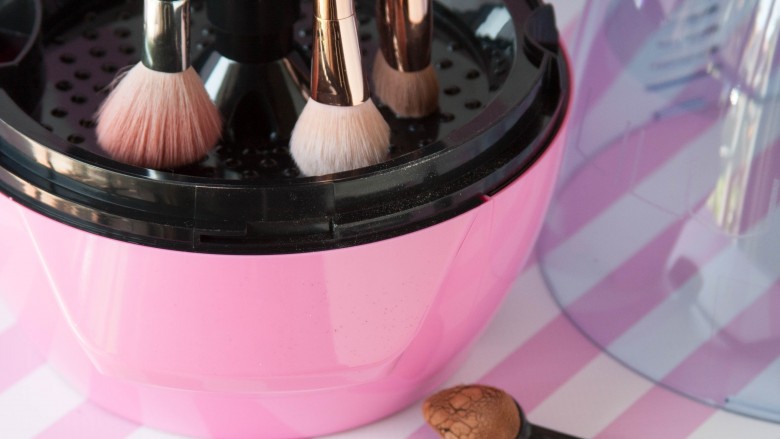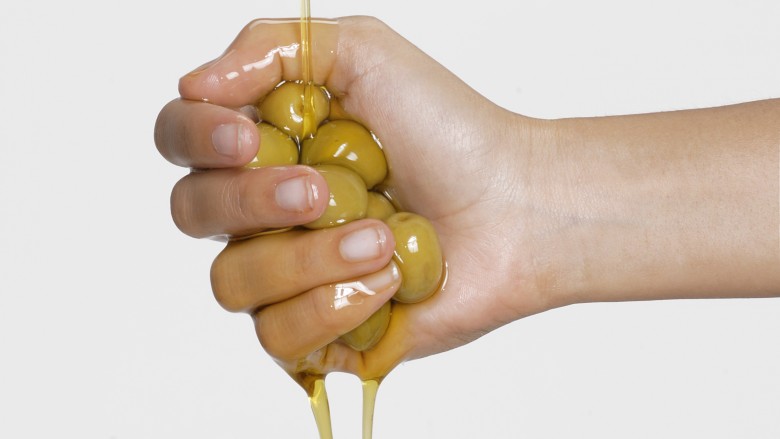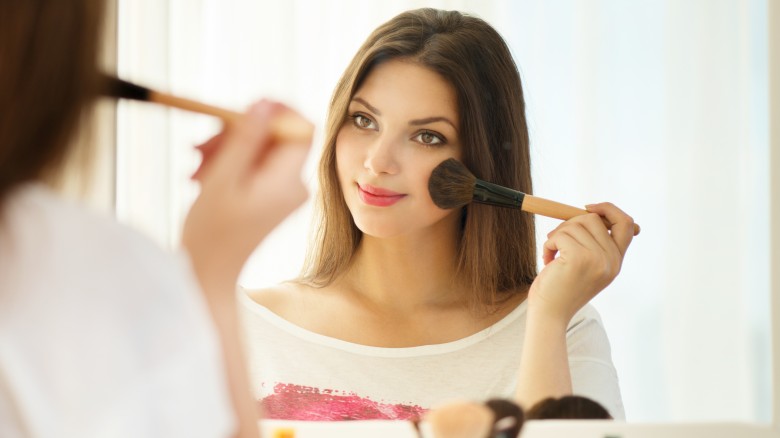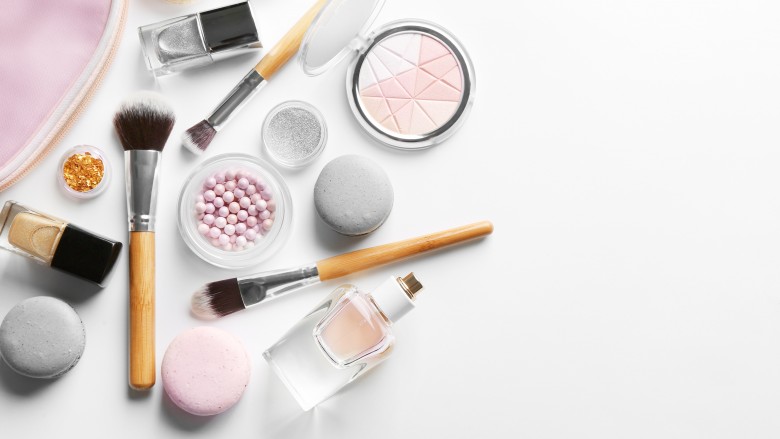How You Should Really Be Cleaning Your Makeup Brushes
We may receive a commission on purchases made from links.
Serious question: when was the last time you cleaned your makeup brushes? Anyone? If you're like me, you're probably cringing right now as you rack your brain for any memory of cleaning those brushes. Wait, they need to be cleaned? Well, don't worry. You're not alone. According to Winq, a social polling app for millennials, at the time of this writing 83% of those polled have gone over a week without cleaning their makeup brushes, while the other 17% clean them at least once a week.
So what does that other 17 percent know that we don't? Turns out clean makeup brushes are actually pretty important, both for your health and for your wallet. "The longevity and performance of your makeup brushes is determined by how well you take care of them," Alejandro Falcon, artistic director for Osmosis Colour Mineral Cosmetics, told me. "Keeping them sanitized regularly is key. Regular sanitation will keep your makeup brushes soft and free of unwanted build up, bacteria, and gunk. Clean brushes have a higher product pick-up rate than those saturated with leftover product, even if the brushes do not appear dirty. Particles can be trapped between the hairs."
Ready to join the smart ones cleaning their brushes? Here are a few cleaning tips to get you started.
How often should I wash my brushes?
Turns out we should be quickly cleansing our makeup brushes after every use. I know, I'm not exactly at the every year mark, let alone every use. This can be a quick spray clean. Try spraying an alcohol-based solution on your brushes daily to avoid dirt and bacteria build-up. Then go for a deeper clean every two to three weeks.
"Treat your makeup brushes like you would treat your own hair," Reanna Saddoris, celebrity makeup artisan at COLOR Salon in Caesars Palace of Las Vegas, tells me. "Typically you would not wait more than a week to shampoo, so take that same attitude when it comes to makeup brushes, especially since some of them are real hair!" Saddoris uses a little baby shampoo on her makeup brushes every week. Sound too simple? Saddoris is the genius behind Britney Spears' stage makeup every night in Vegas, so if it's good enough for Britney, it's good enough for us!
Stick to a schedule
Because it's so hard for most of us to remember to clean our brushes, try sticking with the first of the month or setting an alarm on your phone. Aim for every one to three weeks for a deep clean. A deep clean can mean anything from a rinse with baby shampoo to an olive oil soak. The longer you go between cleanings, the more gunk and bacteria you'll need to remove.
"I would recommend that you wash your foundation brush at least once a week," makeup artist and beauty blogger Hillary Kline told me. "When it comes to brushes you use around the eye area, wash them at least two or three times a month." The most important thing is to set a schedule that you'll actually remember!
Go for a spray cleaner
For your daily cleanings, Alejandro Falcon recommends a cleaner in spray form to cleanse your brushes. "Just mist and then wipe on a towel until no more product is visible," he told me. "Not only does this method thoroughly clean your brushes, but it's easy to do in seconds." If you haven't cleaned your brushes in a while (or ever), you could start by loosening any dirt or stuck-on makeup in the brush with a spare soft bristle toothbrush. Then just spray, wipe, and head out the door.
"Washing makeup brushes is super important and is really simple," beauty and lifestyle expert Delaila Catalino told me. "There are products you can buy specifically for it, such as NYX Makeup Brush Cleaner or IT's Brush Bath Purifying Brush Cleaner, or you can use at-home ingredients to make your own DIY (one part witch hazel, one part mild soap, and an essential oil of your choice such olive oil or jojoba oil)."
Wash them by hand
Once you're spraying down your makeup brushes every day, you'll still want to deep clean them once or twice per month. Alejandro Falcon recommends cleaning your makeup brushes by hand every two to three weeks. First, dab your brushes with water and a drop of gentle face cleanser or baby shampoo. Massage the bristles with your hands, and allow the brushes to dry overnight. "Make sure you are laying the brush on its side rather than placing them upright in a cup to dry overnight," says Falcon. "This will ensure that you don't loosen the glue on the ferule of the brush and lose the brush hairs." We want to make sure that we're lengthening the lifespan of our brushes by washing them, not making the bristles or handles weaker.
Hit the grocery store aisles
You don't need to invest big bucks in a fancy makeup cleaner. In addition to baby shampoo, regular dish soap can do the trick as well. If it's been a while since their last cleaning or your brushes are just looking especially gunky, try massaging them with water and a little detergent. "Regular dish-washing detergent is great at breaking down oils and removing all of the makeup and bacteria," Fiona Stiles, a Los Angeles-based celebrity makeup artist, told Today. Stiles notes that this technique is especially helpful for concealer and lipstick brushes, since these brushes tend to hang on to that cakey makeup buildup faster.
Wipe it off
Another reason that regular cleanings are so important is because of how the makeup looks on your face. If your eyeshadow brushes still have last night's black eyeshadow on them, that's going to blend with your lighter daytime color next time you use it.
"I recommend a couple different kinds of cleaning: a quick spot cleaning, as well as regular deep cleaning. There is a tool called Vera Mona that takes the excess powder off brushes," celebrity makeup artist Mandie Mutchie told me. "This is great to use the same brush in different colors without having the last color bleed into the next one."
If you're looking for a quick way to shake excess color off of your brushes so that you can change colors, look into the color switch duo by Vera Mona. We all want to achieve that perfect smokey eye, but doing so requires switching between eyeshadow colors. The colors can bleed together on your makeup brush, keeping you from the seductive look you're going for. The color switch duo is a product for makeup artists and is just a patch that you can wear on your arm while applying makeup. In between eyeshadow colors, simply rub the brush along the patch to remove any leftover makeup. This will keep your shadow colors looking bright and radiant.
Don't forget the handle
When cleaning your brushes, it's important to keep the handle dry. The brush bristles are attached to the handle with glue, so the more that glue is exposed to soap and water, the weaker it becomes.
However, that doesn't mean the handle shouldn't be cleaned at all. We touch that thing everyday, so it's important the handle gets a good wipe down as well. "I like to use rubbing alcohol on a cotton ball and run it over the handle," Hillary Kline suggested to me. "This will clean the handle and also disinfect."
What about mascara brushes?
It's important to wash all of your makeup brushes, especially the ones that are exposed to damp makeups like foundation or lip color. Another brush to think about is the one for your mascara.
"Anytime a moist bacteria rich environment (like a mascara wand or a foundation brush) comes into contact with your skin you put yourself at risk for infections, dermatitis, and aggravations like styes," CEO and cofounder of Stowaway Cosmetics Julie Fredrickson tells me. "As for brushes like mascara wands that can't be cleaned, TOSS THEM. Mascara expires after 3 months." A new bottle of mascara is a lot cheaper than treatment for an eye infection.
Remember your other tools
It's not just the brushes in your makeup bag that need a regular cleaning to stay safe and effective. Check out any tool you use regularly, such as nail clippers and tweezers. "People assume that tweezers dull over time, but it's actually the residue that makes them less effective," Sania Vucetaj, brow expert and owner of Sania's Brow Bar in New York City, told Today. According to Vucetaj, we should be cleaning our other beauty tools with an alcohol swab every month.
What product should I use?
The best product for washing your brushes depends on your preference. Baby shampoo is nice and gentle. Dish washing detergent is helpful when your makeup is especially stuck on your brushes. You could also go the professional route.
Alejandro Falcon recommends the Osmosis Colour Cosmetics Brush Cleaner for $12. He likes this particular formula because it contains not only gentle cleansers, but also vitamins and nourishing essentials to help extend the life of your brushes.
Go the natural route
Not interested in applying dish soap or other chemicals to the tools touching your face? Natural beauty advocate Britanie Faith prefers making her own natural solution when cleaning her brushes. If you'd like to go the DIY route, first gather your supplies. You'll start with extra virgin olive oil, liquid Castile soap, and distilled white vinegar. Pour a small drop of olive oil into a shallow dish and press the brush bristles into the oil. Swirl the brush around to make sure it's moistened, but make sure the oil doesn't touch the handle. Then fill another shallow bowl with the soap and some warm water. Swirl the brush through the soapy water, then dip the bristles into your white vinegar. Once the old makeup has been loosened and removed by the oil and soap, the vinegar helps kill any bacteria still hanging around. Gently wring out any extra water from your brush and allow it to dry.
Why is cleaning so important?
Now that we know how to clean our brushes, let's face it. Are we really going to be doing this deep clean each week? First, consider how dirty makeup brushes affect your health. "For teens, dirty brushes can lead to acne," family safety advocate Allison Jacobson told The Cleaner Home. "For older women, they can actually cause wrinkles as they can expose the skin to oxidative stress from free radicals, which causes a breakdown of collagen and elastin and can result in premature aging." Did you say premature wrinkles? Okay, hand me the dish soap.
Cleaner makeup brushes can also lead to clearer skin. "Think about it, if you use a foundation brush, use product, wipe it all over your face,then get a zit, then use the same brush without cleaning it," warns Hillary Kline. "The bacteria is just being reapplied all over your face again." If your skin has been breaking out lately, make sure to clean your brushes right away to stop the cycle.
Save some dough
Dirty makeup brushes don't just affect our health. They steal from our wallets as well. Not only can they lead to infections (and costly doctor's appointments), but you'll have to replace the brushes more often.
"Dirty brushes could cause acne or even worse: eye infections," celebrity makeup artist Mandie Mutchie told me. "Additionally, if you use a dirty brush, the colors you used last time will blend into the colors you are trying to use, and you have less control over the outcome of your makeup look."
Finally, let's face it. Quality makeup brushes are expensive. In order to protect your investment, make sure to clean them regularly. Otherwise you'll wind up right back at Sephora dropping some major cash all over again.
"We end up throwing brushes away because it's too late to salvage them by the time we get to them," Francesca Roman, a makeup artist at Butterfly Studio Salon in New York City, told Today. "Neglect that $20 brush and it will quickly end up looking like a stack of mottled hay."

